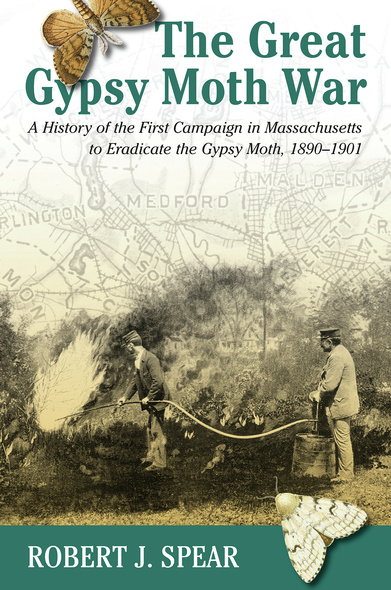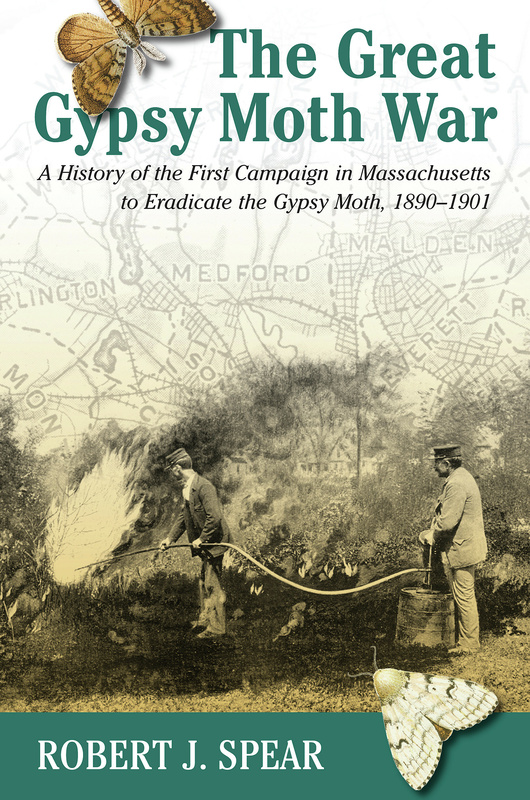The Great Gypsy Moth War
A History of the First Campaign in Massachusetts to Eradicate the Gypsy Moth, 1890-1901
University of Massachusetts Press
In The Great Gypsy Moth War, Robert J. Spear presents the untold story behind the importation and release of the gypsy moth in North America and the astonishing series of coincidences that brought the state of Massachusetts to a decade-long war against this tenacious insect. Spear traces the events leading up to the beginning of the war in 1890, notes the causes for its failure, and shows the terrible legacy it left as the precedent for all subsequent insect-eradication campaigns.
During the Civil War, when the supply of cotton from southern fields was disrupted, the owners of northern textile mills looked elsewhere for raw fiber. One source was silk. Among those experimenting with silkworm production was a Frenchman named Etienne Leopold Trouvelot, who had settled outside of Boston. It was Trouvelot who imported the gypsy moths and inadvertently allowed them to escape. Soon the invasion was on and a counteroffensive was required.
Spear reveals the turbulent undercurrents in the eradication campaign when the enthusiasm of the entomologists in charge turned into desperation upon the discovery that their alien adversary was much tougher than they thought. Fighting a war they could not win and dared not lose, the leaders of the campaign resorted to political maneuvering, cheap tricks, and outright misrepresentation to maintain a façade of success, urging the Commonwealth to continue funding the war long after any chance of victory had faded.
More than just reviewing the important events of this historic episode, Spear tells the story in an engaging way, often through the first-hand accounts of those who were directly involved. Much of what Spear has written is new, the recounting is lively, and the information he presents shows that almost all of the previous beliefs about the campaign to eradicate the gypsy moths are myths. In the process, he also traces the rise of modern economic entomology and the birth of the pesticide industry.
During the Civil War, when the supply of cotton from southern fields was disrupted, the owners of northern textile mills looked elsewhere for raw fiber. One source was silk. Among those experimenting with silkworm production was a Frenchman named Etienne Leopold Trouvelot, who had settled outside of Boston. It was Trouvelot who imported the gypsy moths and inadvertently allowed them to escape. Soon the invasion was on and a counteroffensive was required.
Spear reveals the turbulent undercurrents in the eradication campaign when the enthusiasm of the entomologists in charge turned into desperation upon the discovery that their alien adversary was much tougher than they thought. Fighting a war they could not win and dared not lose, the leaders of the campaign resorted to political maneuvering, cheap tricks, and outright misrepresentation to maintain a façade of success, urging the Commonwealth to continue funding the war long after any chance of victory had faded.
More than just reviewing the important events of this historic episode, Spear tells the story in an engaging way, often through the first-hand accounts of those who were directly involved. Much of what Spear has written is new, the recounting is lively, and the information he presents shows that almost all of the previous beliefs about the campaign to eradicate the gypsy moths are myths. In the process, he also traces the rise of modern economic entomology and the birth of the pesticide industry.
Control of invasive species has become a major issue in ecology and policy circles in the last decade. Spear's book is precisely the kind of solid historical work that can aid citizens and policymakers to interpret contemporary debates more effectively.'—Philip J. Pauly, Rutgers University
'Spear presents an absorbing tale of scientific hubris and economic folly.'—Michael Kenney, The Boston Sunday Globe
'Spears rebuts the myth that the moth was nearly eliminated and the efforts failed because the state irrationally terminated its funding. He shows that the entomologists in fact recognized their attempts to contain and kill the species were futile. . . .This informative account provides a useful historical perspective for anyone interested in the biology and control of invasive species.'—Science Magazine
'Not only provides important perspectives on the pre-World War I era of insect control and the professionalization of economic entomology; it also offers the perfect setting for a horror flick.'—ISIS
''The Great Gypsy Moth War' is a disturbing and engrossing cautionary tale with multidisciplinary applications. It is recommended as supplementary reading to coursework in environmental studies, political science, and public administration.'—Historical Journal of Massachusetts
Robert Spear is a violinmaker, author, and independent scholar.





